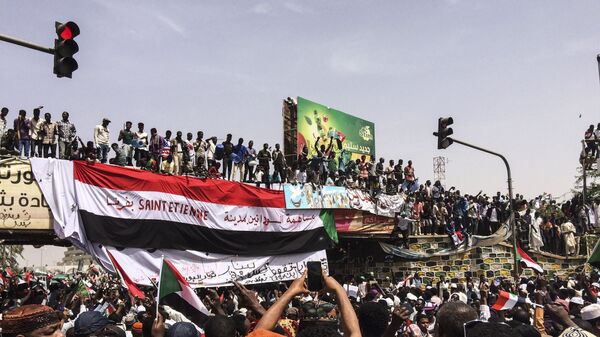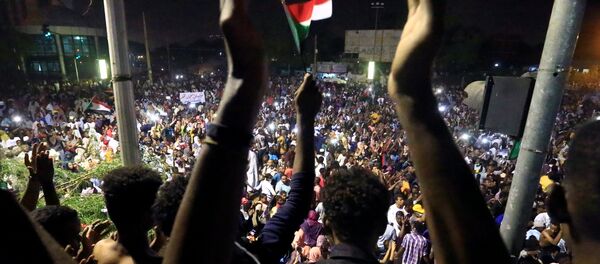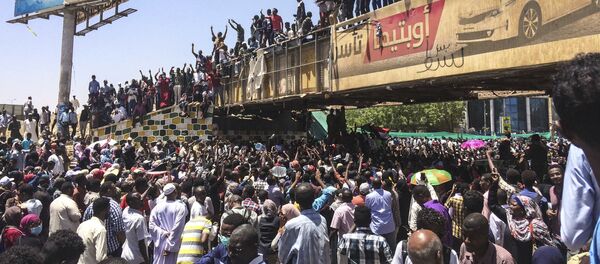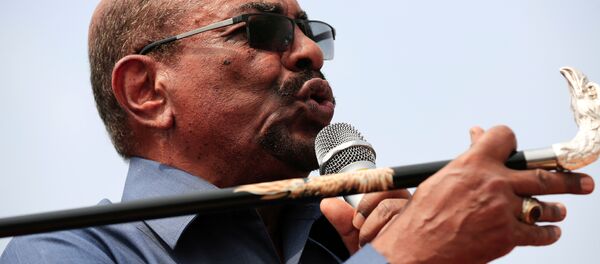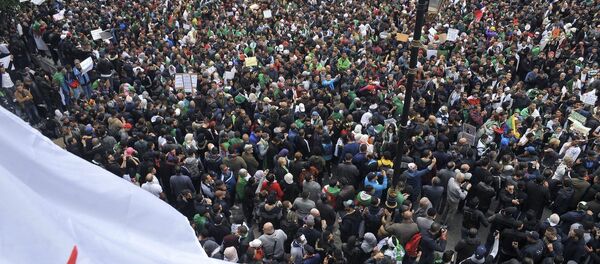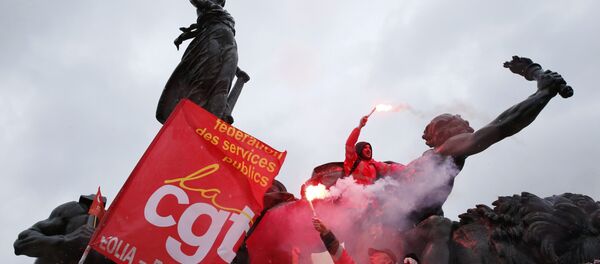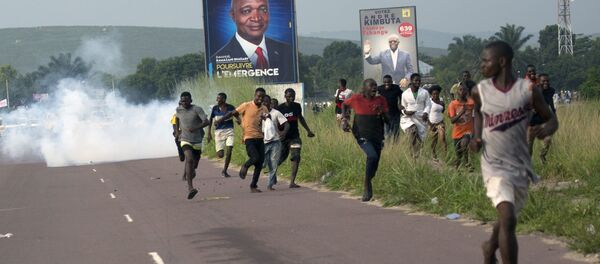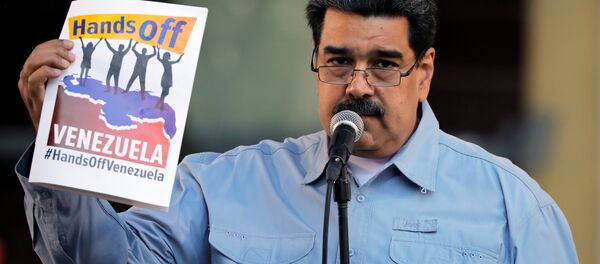A Sudanese activist told Sputnik Friday their movement has buttressed their long culture of resistance with the lessons of movements across the continent, and that's why they're more united than ever.
The latest protests began in December 2018, sparked, as so many revolutions have been, by a sharp rise in the price of bread, along with cuts to government subsidies for bread and fuel. At least 59 people have been killed in the more than 700 protests that have erupted across the country since then, as Bashir's government declared a state of emergency and resorted to violence to repress the demonstrations.
At the forefront of this mass movement have been Sudanese workers and professionals, led by groups including the nonviolent resistance movement Girifna, the banned Sudanese Professionals Association (SPA) labor union and the powerful Sudanese Communist Party, among numerous other resistance groups that have formed under Bashir's 30-year-long military dictatorship.
Radio Sputnik's By Any Means Necessary spoke with Mac Hamilton, executive manager at STAND: The Student-led Movement to End Mass Atrocities, and Hajooj Kuka, a filmmaker and member of Girifna, about the rise of the Sudanese people and their long culture of resistance.
Indeed, only hours after the interview aired on Radio Sputnik and before this story went to publication, Ibn Auf announced his resignation.
"The beautiful thing about our revolution is, it started after years and years — our Girifna, our nonviolent movement, has been going on for 10 years. There's been civil society growing and organizing together, and we have this beautiful community of resistance for a very long time," Kuka said. "In December, everything came together, where there was this spontaneous uprising that then became organized, and then we started having something called the ‘freedom and change declaration,' which was an initiative by the Sudanese Professionals Association, that everybody got under this umbrella."
"And the thing about this umbrella is, we don't know exactly what we want, we're all united — we want a transitional period that's going to take us into democracy, and this transitional period has already been decided to be four years, and this period has already been decided that it's going to be run by technocrats who are professionals in their fields," Kuka explained. "Through this period we're going to have our constitution fixed, we're going to get everything ready. So it's like, we need to sit together as people and decide: how do we want to run this country, how do we want to go forward, how do we solve the issues we have and how do we rule ourselves?"
"The question is not ‘who rules us,' it's ‘how will we rule ourselves?' And we want to give ourselves this period, and we all sat together and decided on this. So it's really exciting to be united; it's been such a long time that now we finally feel united, and it's such a pleasure to see the Sudanese people all together. It brought tears to my eyes… everybody's in the street," Kuka told hosts Eugene Puryear and Sean Blackmon.
"The Sudanese people are not new to regime overthrow," Hamilton noted, recalling that Bashir's is the third such regime they've overthrown by mass protest. The first, a nationwide general strike in October 1964, forced the Ibrahim Abbud administration to dissolve his military government, adopt a transitional constitution and hold elections the following year. The second, in 1985, saw a general strike that started in the capital of Khartoum spread across the country, forcing an end to Colonel Jaafar an-Nimieiri's 16-year military dictatorship.
Hamilton noted that Bashir maintained his 30-year grip on power since the bloodless 1989 coup d'etat that brought him to power in a number of ways. The biggest was a "lack of political will to bring him to justice for his crimes," Hamilton said, noting that a South African court had weighed enforcing an International Criminal Court warrant for Bashir last year for the genocide in Sudan's western Darfur region in 2003, but acted too slowly to apprehend him in time.
"I think the backing of the military, which we've seen deteriorate in recent days, largely due to the mass protests in front of the military headquarters, that's really allowed him to prop himself up," Hamilton said, noting, however, that it's the military that's still in control. "They're not pulling the wool over anyone's eyes by just instating Ibn Auf, who's the defense minister and who has also been, I believe he was the head of the Janjaweed at the height of the genocide," a mounted militia that was one of the main perpetrators of the massacres of Fur, Masalit and Zaghawa tribes in Darfur beginning in 2003. Various estimates judge the genocide to have killed between 100,000 to 400,000 people in Sudan and affected over 3 million.
"I think it's a rose by any other name. I think the Sudanese people know when the military is trying to pull the wool over their eyes," Hamilton said. "Who knows, Bashir could still be behind the Ibn Auf piece of this."
Kuka noted that Bashir's regime was "using 70 percent of their resources for security… What happened was two things: one, the CIA really loved Omar al-Bashir, because he had Islamic ties, it was an Islamic military dictatorship, so he had a lot of connections with Islamic groups, and he was able to help the CIA a lot with giving up information in return for money," getting sanctions against him removed, because the CIA "cared more about terrorism and whatnot than human rights and dealing with a dictator."
"The second [thing] was in Europe, they had this so-called ‘immigration problem.' After Libya collapsed [in 2011], they needed Sudan to stop people to cross over into Libya and going to Europe — people from Sudan, from Eritrea, from Ethiopia — a lot of people cross through Sudan into Libya.," Kuka explained. "So the European Union gave 150 million euros to Sudan, and all that money went to… the Janjaweed… so they took the money, and they suddenly became the ones who stopped the immigrants."
Kuka said since 2009, before the Arab Spring, Girifna has been studying the methods of resistance movements across Africa and throughout history, from Martin Luther King Jr. to current movements in Democratic Republic of the Congo, Algeria, the Arab Spring and more, noting that networking across the continent has dramatically increased with the most recent wave of demonstrations.
"Thanks to Twitter, thanks to all these things, we're able to communicate, able to come in solidarity and be able to break this barrier that national security once had on us. Where because of, for example, the Sudanese government banning the use of WhatsApp and Facebook in the protest, everybody put VPN on their phones. So now, almost everybody in Sudan is super-secure because they're all using VPN, and they're using encrypted stuff, and we're on Telegram, and we became very sophisticated," Kuka said, noting that this included everybody, not just activists. "My mother's on VPN," he said.
"Learning from each other and solidarity and getting together is now possible because of the internet, because of our ability to communicate, that we didn't have before," the activist said.
"It's really hard to be in a protest," Kuka said, "you have to expect to be beaten; there's a lot of people who got killed… Up to April 6, people were scared to come out. April 6 broke it, because we had the genius plan of ‘let's go to the army and see if they're going to protect us,' because the people who were beating us were the police and the national security. So we went to the army headquarters, and that's where we had the protest."
"And people in the army stood next to us," Kuka said. "They broke rank, they didn't listen to their commanders, and they basically said, ‘Nobody's going to beat these people up; you're not going to kill them; we're going to fight back."
This created a safer space to protest, encouraging huge numbers of people to come out who'd previously been too scared, Kuka explained. But once people were in the streets, it didn't matter that Ibn Auf tried to clear them. "People said, ‘We're not going to go home,' and the soldiers said, ‘We're not going to listen to Ibn Auf. We're listening to our people, and we're going to protect them."
As people in the streets saw the the 10 p.m. curfew come and go without incident, further mystiques of power were dispelled, emboldening the people to force Ibn Auf to listen to them.
"We know how to fight. We are organized, we are united, we actually have people in the army, people outside, everybody's on our side, we know we can do this," Kuka told Sputnik. "We're very strong, and we're staying."
